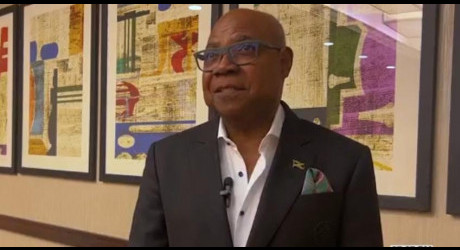Following the ruling by the Supreme Court on Friday, National Security Minister, Senator Dwight Nelson, said the government had no intention of renewing the provisions in the Bail Act, which have now been ruled unconstitutional.
“When it was passed in July 2010 there was no constitutional provision for bail. Under the new Charter of rights there is a presumption for Bail , so under the Charter of rights now it would be unconstitutional so that is why we are not going to seek an extension when it expires on the 23rd of July” said the National Security Minister.
And Opposition Spokesman on Justice, Senator Mark Golding says members of the Opposition had warned the government that certain provisions in the Crime Bills were in breach of the constitution when the bills were subject to the scrutiny of both Houses of Parliament, last year.
Senator Golding says the decision is not surprising, and it vindicates the rule of law.
“The Opposition had expressed great concerns with aspects of that legislation. The mandatory denial of bail for sixty days with no provision for discretion in the court where there were exceptional circumstances, we felt was unjust , so we didn’t support it. I think its vindication for the rule of law…. So I’m not surprised at all”
Meanwhile, former Resident Magistrate-turned-State Minister, Marlene Malahoo Forte, steered clear of stating whether the Golding Administration erred in seeking to approve the provisions in he Bail Act, which have now been found to be unconstitutional.
Following Friday’s meeting of the Senate the Attorney-at-Law said the Supreme Court ruling is not unusual.
“Remember there is a presumption of constitutionality in any law passed by Parliament unless or until it is declared unconstitutional by the courts. So Parliaments have the role to make laws and the Courts have the role interpret them .I’m saying that the legislation did what it had to do to deal with the crime situation, the court did what it is charged to do”
IJCR weighs in
And, the Independent Jamaican Council for Human Rights (IJCHR) is urging parliamentarians to vote against the renewal of the life of the two crime bills up for extension this month.
Both the Constabulary Force and the Bail (Interim Provisions For Specified Offences) Acts, which became law on July 22, last year, contained provisions setting their duration for one year only.
The Constabulary Force Act permits a person to be detained by the police and remanded for not in excess of 72 hours before being charged or released.
Before that provision, the police had to charge persons within 24 hours and bring them before a court forthwith.
The amended Bail Act permits the police to hold a person charged with specific offences - primarily those related to firearms - for 60 days without bail and, when requesting bail, the person is required to satisfy the court that bail should be granted.
The IJCHR says the new Charter of Fundamental Rights and Freedoms specifically addresses bail, noting that any person awaiting trial and detained in custody shall be entitled to bail on reasonable conditions, unless sufficient cause is shown for keeping him or her in custody.
The human rights organization also says that the mandatory imposition of a 60-day period of imprisonment only by virtue of being charged with an offence, under the amended Bail Act, interfered with judicial function.
The group says the amended Bail Act does not allow for the consideration of the particular circumstances of the individual, such as age, state of health, physical and mental well being; the circumstances of identification, and other matters normally considered at the bail application by the judge.
Therefore, the IJCHR says it sees no reasonable justification for the extension of the pieces of legislation.









 All feeds
All feeds







